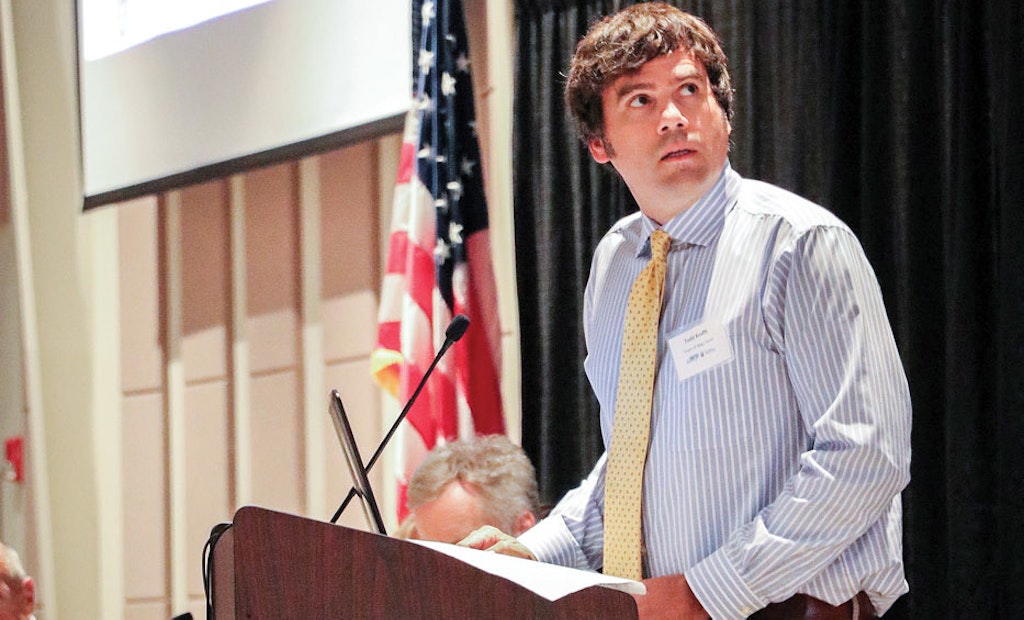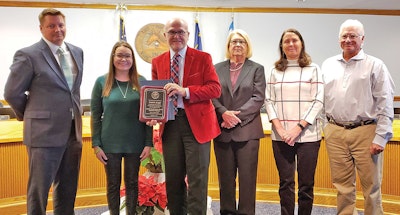
Todd Krafft speaks about the Septic Health Initiative at the North Carolina Coastal Resilience Summit last June. (Photos courtesy of Town of Nags Head)
In 2000, the thriving North Carolina beach town of Nags Head faced the same challenges with maintaining its decentralized wastewater systems as many other sensitive regions of the U.S. Local officials wanted to ensure a clean environment and safe groundwater, but the county and state had no laws requiring mandatory septic inspections.
The Nags Head Board of Commissioners felt it was their responsibility to monitor onsite wastewater systems, so it started what was then an innovative voluntary program called the Septic Health Initiative and put a young environmental planner in charge of educating the community. The program thrived and became a model for public septic education and assistance programs, even being profiled in the National Environmental Services Center’s Small Flows Quarterly magazine in 2003.
For nearly 20 years, the program in the small coastal town of about 3,000 permanent residents (which balloons to 40,000 to 50,000 during the tourist season) successfully raised environmental awareness about septic system care. Funded by $250,000 annually from the town water fund, the program coordinates free septic inspections, subsidizes septic pumpouts and offers low-interest loans to homeowners who need system upgrades.
As the program grew and gained notoriety, Todd Krafft was on the front lines, tirelessly promoting system maintenance by meeting with community groups, Realtors and residents one-on-one, spreading the word and getting positive results. In 2016, Krafft was honored by Nags Head officials as the Earl Murray Jr. Employee of the Year.
However for many years, Krafft suffered the debilitating effects of Lyme disease, caused by the bite of an infected tick. In fall 2019, Krafft died suddenly at age 46. A few months later, the town renamed the septic program the Todd D. Krafft Septic Health Initiative in honor of the former U.S. Air Force veteran who had served in the Somali conflict, the Bosnian war and Desert Shield/Storm before dedicating his life to Nags Head and onsite wastewater.
DIGGING DEEPER
When I read a brief news story about the town honoring Krafft, my reaction was to seek out more information about an unsung hero in our industry. What I learned was that Krafft had a passion for a topic most folks don’t want to know anything about and he derived great satisfaction playing a role in improving the environment around him.
Working with the mayor at the time, Bob Muller, Krafft spearheaded the septic education program aimed at maintaining water quality in a community that wanted to promote use of onsite systems. While some towns, like Kill Devil Hills, just to the north, moved toward sewer treatment plants, Nags Head officials felt that keeping properties 80% to 90% on septic systems would be a hedge against overdevelopment and help maintain the character of the town, according to Michael Zehner, Nags Head planning and development director.
But without required system inspections or mandatory pumping in place, the town turned to property owner education and voluntary inspection and maintenance to ensure groundwater quality. Since its inception, the program has loaned $500,000 in low-interest loans to homeowners for system upgrades. The town offers property owners free onsite system inspections every two years, and about 200 per year take the town up on its offer. And if pumping is found to be necessary, property owners receive a $30 credit on their water bills as a way of community cost sharing.
And all along, Krafft was the face of the program for the town. Zehner says Krafft did the educational outreach with community groups and met with each homeowner asking for an inspection. He saw clean water as his mission.
“It was something Todd was focused on, the relationship between septic health and water quality, and the importance of maintaining septic systems and the impact they might have on the natural resources that make this place what it is,” Zehner says. “The appreciation they had for his experience and his patience working with them really impressed me. I knew immediately how passionate he was for this program.”
SERIOUS ILLNESS
And while Krafft was successful in his mission and recognized for his contributions, he was also tormented by a disease that caused him great pain. Lyme disease was a daily companion, but not one that kept Krafft from his important work.
Jimmy McNeill of McNeill’s Septic maintains about 200 systems in Nags Head, varying from 300- to 30,000-gpd advanced systems that need to be serviced weekly, monthly or every six months. Over 20 years, McNeill and Krafft became great friends, and McNeill witnessed how Lyme disease affected Krafft.
“Every day he fought to get out of bed and go to work because he loved what he did. Todd was loved by the community, and he loved his job,” McNeill says. “He was in more pain than we all knew. Every now and then he would say how bad it hurt and so forth. Customers didn’t have any idea. He would put on a smiling face and go to work.”
And work he did. McNeill often went out with Krafft when he visited homeowners to explain how their septic systems worked and why it was important to maintain, pump and sometimes repair them at great cost. The job took patience, understanding and a desire to help others.
“Todd went out of his way, working early in the morning, later in the evening, on weekends. If he had to work two hours off the clock at night, he did it,” McNeill recalls. “He was a very caring person. A lot of people don’t know anything about septics. It’s overwhelming for a lot of people, but Todd would sit down with them and go over questions. He was great with people, and they loved him.”
Krafft’s role was very important in a community with a sensitive waterfront ecosystem and continuing pressure to increase development along a popular strip of sand. He developed a close working relationship with town officials and onsite professionals and both sides had great respect for him, according to McNeill. That can be a difficult tightrope to walk, as many installers, designers and regulators can attest to.
When a resident needed repair or replacement work for an onsite system, Krafft would suggest contractors who could do the job to the homeowner’s satisfaction. Sharing bad news with homeowners about expensive repairs and recommending a variety of contractors for the work could lead to hard feelings.
“But the way Todd was with people, they felt very comfortable with it. They didn’t think someone was trying to get something over on them,” McNeill says. “Todd took this program to the next level. He was a great guy, and I miss him every day.”
TAKING ACTION
Renaming the septic program after Krafft was an obvious choice, according to Zehner. He was a driving force of the success of the program to date, and his memory will help move it forward. As climate change causes rising water along the coastline, caring for onsite systems will only become more important. Before he died, Krafft was lobbying to raise the pumping credit to $45 and continuing to look for ways to evolve the program, Zehner says.
“Through Todd’s influence and involvement in the community, there is a sense of proactiveness that is inherent in the program. We want to continue to improve the program because that’s what Todd always wanted to do. He didn’t want to maintain the status quo,” Zehner says.
The town is also working with Krafft’s family to raise awareness of Lyme disease, which until recently was not thought to be prevalent to that part of North Carolina. Krafft’s illness went undiagnosed for a period of time, and his family and friends in town government don’t want that to happen to another person. The town is organizing a fun run in Krafft’s name in May, which is National Lyme Disease Awareness Month.
PAYING TRIBUTE
It’s important to honor the contributions of Krafft and other hardworking people in our industry. The story of Krafft’s struggle with Lyme disease is also instructive to installers who are working in the field and could be exposed to infected ticks at any time.
If you have a story you’d like us to follow up on in Onsite Installer, please contact me at editor@onsiteinstaller.com.






